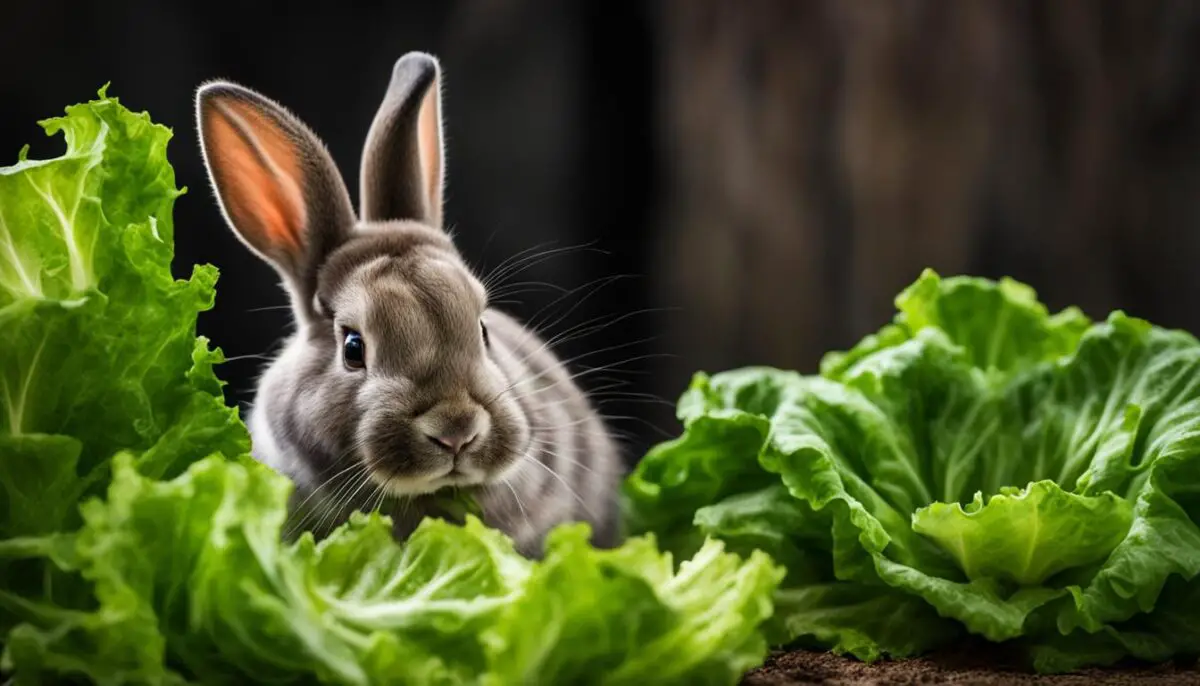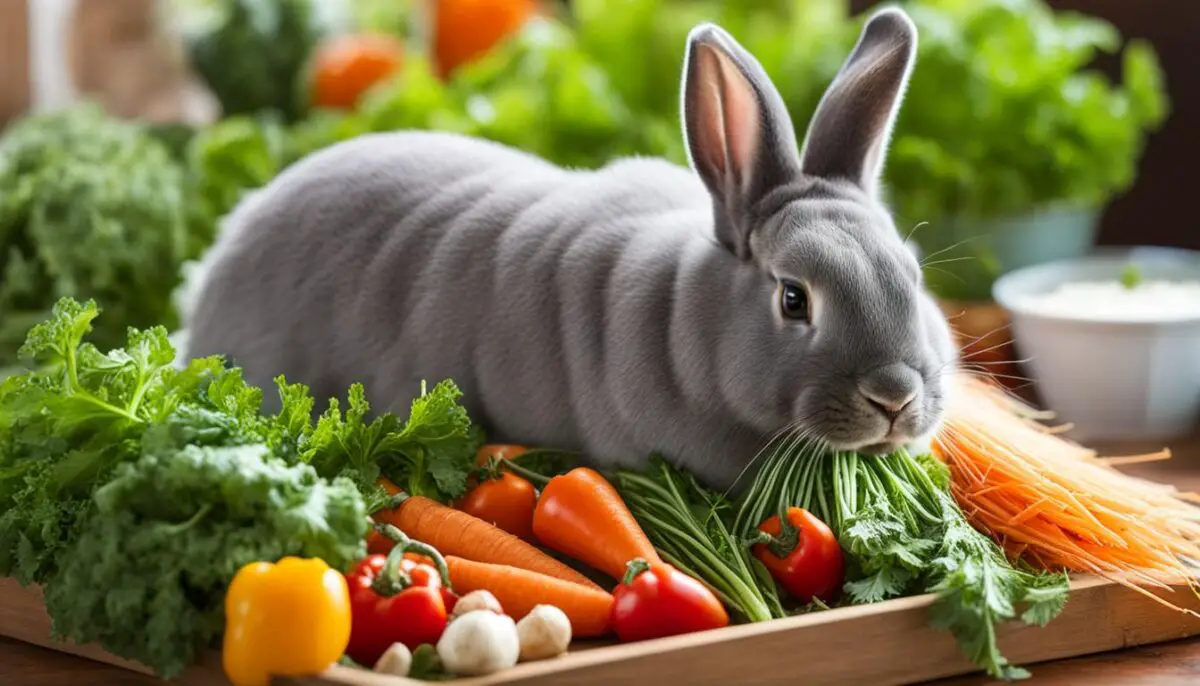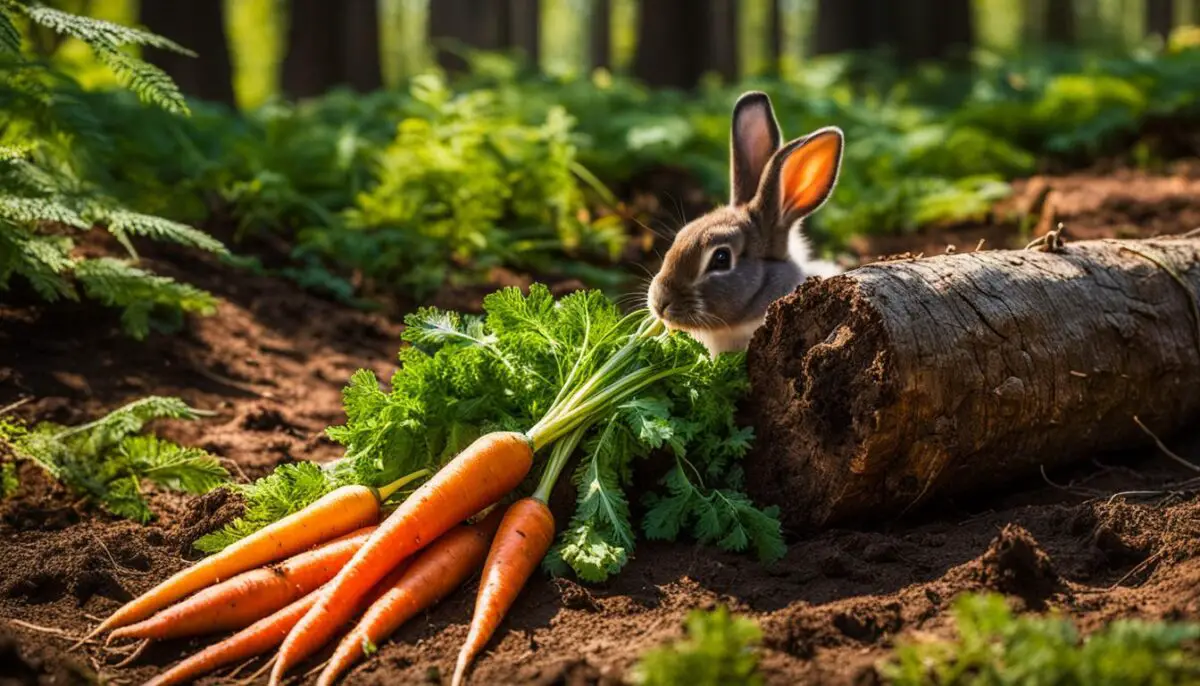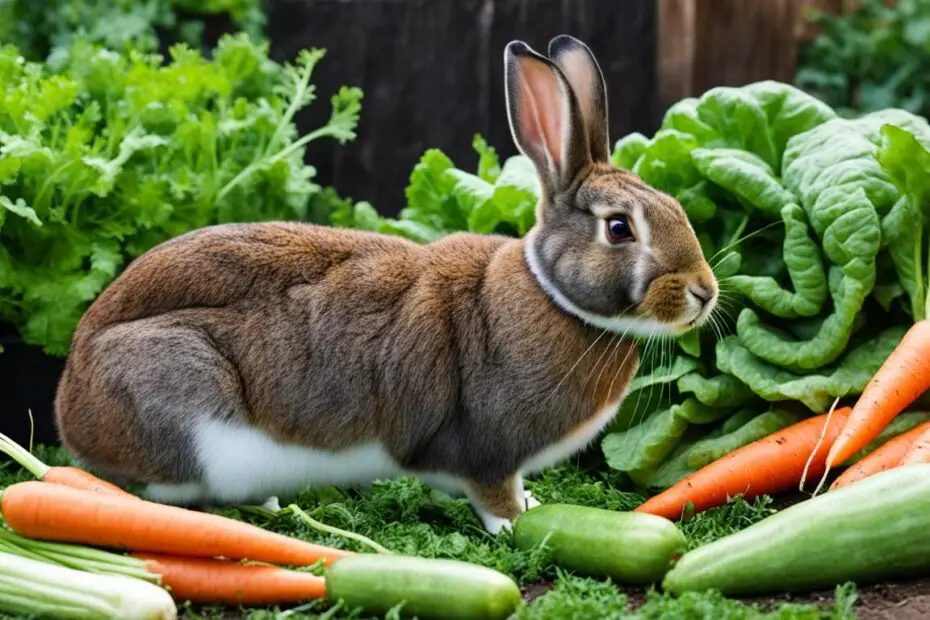When it comes to rabbits and their diet, there is a common belief that carrots are their go-to food. However, there is more to this story than meets the eye. Contrary to popular belief, rabbits do not naturally eat carrots as part of their diet. While it may be tempting to feed your furry friend a handful of carrots, it is essential to know the facts and make informed choices about their nutrition.
Too many carrots can actually be harmful to rabbits and may require a visit to the vet. Carrots are high in sugar and should only be given to rabbits as an occasional treat, in small quantities. Feeding rabbits a diet solely consisting of carrots can lead to digestive problems and nutritional imbalances, compromising their health.
Rabbit owners must understand the importance of providing a well-balanced diet to their pets. A rabbit’s diet should primarily consist of high-quality feeding hay or grass, which is essential for maintaining a healthy gut and preventing dental issues. Leafy greens, vegetables, and herbs should also be included in their diet, along with small amounts of pelleted rabbit food for added nutrition.
Key Takeaways
- Rabbits do not naturally eat carrots as part of their diet.
- Feeding rabbits an excessive amount of carrots can be harmful to their health.
- A well-balanced diet for rabbits includes high-quality feeding hay, leafy greens, vegetables, herbs, and small amounts of pelleted rabbit food.
- Carrots should only be given to rabbits as an occasional treat, in small quantities.
- Consult a veterinarian for guidance on the appropriate diet for your rabbit.
What Other Foods Should Bunny Owners Avoid?
When it comes to feeding your beloved bunny, it’s important to know which foods to avoid. While rabbits have a diverse diet, there are certain items that can be harmful or even toxic to them. Here are some foods that should not be part of a rabbit’s regular diet:
- Lettuce: Lettuce, especially iceberg lettuce, can be harmful to rabbits in large quantities. It contains lactucarium, which can cause diarrhea and digestive issues.
- Chard: Chard is known to cause colic and bloating in rabbits. It is best to avoid feeding chard to your furry friend.
- Fruit: While fruits can be a tasty treat for rabbits, some fruits are high in sugar and should not be a regular part of their diet. Avocados and rhubarb, in particular, should be avoided due to their potential toxicity.
- Grass Cuttings: While rabbits enjoy grazing on fresh grass, feeding them piles of grass cuttings can be harmful. Cuttings can ferment and cause gastrointestinal issues, so it’s best to stick to fresh grass.
- Bread and Pasta: High-carb foods like bread, pasta, and crackers can disrupt a rabbit’s digestive system and cause stomach issues. It’s best to avoid feeding these foods to your bunny.
- Nuts: Nuts are high in fat and not easily digestible for rabbits. Feeding nuts to your pet can lead to indigestion and other digestive problems.
- Rabbit Muesli: While marketed as a complete food, rabbit muesli is often not nutritionally balanced for rabbits. It can lead to selective eating and nutritional deficiencies.
It’s important to remember that a healthy rabbit diet should consist of hay, leafy greens, vegetables, and a small amount of pellets. Avoiding these foods and providing a balanced diet will help keep your bunny happy and healthy.

As with any dietary changes, it’s always best to consult with a veterinarian who specializes in rabbits to ensure that your furry friend is getting the proper nutrition and care.
What Should You Be Feeding Your Rabbits?
When it comes to the diet of your furry bunny friends, it is important to provide them with the ideal combination of foods to keep them healthy and happy. The Rabbit Welfare Association recommends a balanced bunny diet that consists of:
- 80% unlimited grass or high-quality feeding hay
- 15% rabbit-safe leafy greens, vegetables, and herbs
- 5% pelleted rabbit food

Grass or high-quality feeding hay should make up the majority of a rabbit’s diet as they provide essential fiber and help maintain a healthy gut. It is crucial for rabbits to have access to fresh grass or hay at all times, as it aids in digestion and prevents gastrointestinal issues.
Rabbit-safe leafy greens, vegetables, and herbs should also be included in their diet to provide essential nutrients. Opt for rabbit-friendly options such as carrot tops, kale, romaine lettuce, and dandelion leaves. These leafy greens are packed with vitamins and minerals that promote overall well-being.
Lastly, pelleted rabbit food should be given in small amounts to ensure that rabbits receive the necessary vitamins and minerals that may be lacking in their hay and leafy greens. Pelleted food provides a balanced nutritional profile and helps keep rabbits healthy and strong.
Here’s a breakdown of the ideal bunny diet:
| Food Type | Percentage |
|---|---|
| Grass or high-quality feeding hay | 80% |
| Rabbit-safe leafy greens, vegetables, and herbs | 15% |
| Pelleted rabbit food | 5% |
It is essential to provide fresh, clean drinking water to rabbits daily, as proper hydration is crucial for their overall health.
The Importance of Feeding Hay to Rabbits
Feeding hay to rabbits plays a vital role in maintaining their overall health and well-being. It provides essential fiber that helps them maintain a healthy gut and prevents the development of dental diseases. Rabbits have continuously growing teeth, and chewing on hay helps grind them down, preventing dental issues.
High-quality feeding hay is particularly important as it ensures that rabbits receive the necessary nutrients and dietary fiber. It is crucial to differentiate between feeding hay and bedding hay, as the latter may not have sufficient nutritional value for rabbits. Therefore, it is essential to provide rabbits with high-quality feeding hay at all times.
Prevention of Dental Disease in Rabbits
Rabbits’ teeth grow continuously throughout their lives, meaning they require constant wear to prevent overgrowth. The grinding action involved in chewing hay helps naturally wear down their teeth and prevents dental disease, such as malocclusion.
Dental disease in rabbits can lead to a range of health problems, including painful mouth ulcers, difficulty eating, weight loss, and even abscesses. By providing rabbits with access to hay, owners can ensure that their teeth are appropriately worn down, reducing the risk of dental issues and promoting oral health.
The Role of Fiber in a Rabbit’s Diet
Fiber is an essential component of a rabbit’s diet and is crucial for maintaining proper digestive function. Rabbits have a unique digestive system that relies on an ample supply of fiber to keep their gut healthy and functioning optimally.
In addition to aiding digestion, fiber helps prevent gastrointestinal issues, such as bloating and gastrointestinal stasis, which can be life-threatening for rabbits. Feeding hay to rabbits ensures that they receive an adequate amount of fiber, supporting their digestive health and overall well-being.

Myth: Rabbits only eat carrots
“Rabbits have diverse dietary needs and do not solely depend on carrots for nutrition. Providing a variety of fresh foods, along with high-quality feeding hay, is crucial for their well-being.”
Rabbits are not selective eaters, and their diet should consist of a wide range of foods to meet their nutritional requirements. Feeding rabbits a diet exclusively based on carrots can lead to nutrient deficiencies and health issues.
Myth: Carrots are a healthy and natural choice for rabbits
“While carrots may seem like a healthy snack, they should be given in moderation to rabbits. The high sugar content of carrots can disrupt their delicate digestive system and potentially lead to obesity.”
Although carrots contain important nutrients, the high sugar content can be detrimental to rabbits’ overall health. It’s important to offer carrots as an occasional treat rather than a regular part of their diet.
Myth: Bugs Bunny represents the natural behavior of rabbits
“Bugs Bunny may be an entertaining character, but he does not accurately represent the dietary needs or behavior of real-life rabbits.”
Bugs Bunny’s affinity for carrots in popular culture has perpetuated the misconception that rabbits thrive on a carrot-centric diet. In reality, rabbits have unique dietary needs that require a well-rounded mix of foods to maintain good health.
| Common Rabbit Diet Myths | Reality |
|---|---|
| Rabbits solely eat carrots | Rabbits need a diverse diet of hay, leafy greens, and vegetables |
| Carrots are a healthy choice for rabbits | Carrots should be given in moderation due to their high sugar content |
| Bugs Bunny’s diet represents rabbit behavior | Bugs Bunny is a fictional character and does not reflect real rabbits’ dietary preferences |
Other Animals’ Surprising Diets
While rabbits have their unique dietary preferences, they are not the only animals that will surprise you with their eating habits. Let’s explore some intriguing examples:
Bears: A Plant-Based Diet
Most people associate bears with a carnivorous diet, but the truth is, bears like black bears and grizzlies have a predominantly plant-based diet. They feast on various vegetarian delights like dandelions, berries, grasses, and other plant matter.
Squirrels: Mushroom Jerky
Ever wondered what squirrels do with the mushrooms they find? Surprisingly, squirrels are known to hang fungi on tree branches to dry them out. This process creates a unique snack for them – a sort of mushroom jerky!
Pandas: Unusual Rotting Carcasses
Pandas are famous for their bamboo-based diet, but occasionally they venture into the unusual realm of rotting carcasses. When given the opportunity, pandas have been observed eating the decaying remains of animals. It seems that even these gentle herbivores have a taste for the unexpected.
Deer: A Surprising Meal
While deer are commonly associated with grazing on grass and leaves, they have been known to consume baby birds occasionally. This unexpected behavior showcases the diverse tastes and adaptations within the animal kingdom.
Mosquitoes: Blood for Protein
You might think of mosquitoes solely as annoying bloodsuckers, but there’s a reason behind their feeding frenzy. Only the female mosquitoes drink blood, and they do it not for the sake of irritation, but to obtain protein for the production of eggs. It’s their way of ensuring the survival of their offspring.
Bonnethead Sharks: A Seagrass Feast
While most sharks have a diet dominated by marine prey, the bonnethead shark breaks the norm by feasting on sea grass. These small sharks have adapted to digest and derive nutrients from consuming seagrass, showcasing their unique feeding habits.
As you can see, animals have diverse and surprising diets that go beyond expectation. Nature never ceases to amaze us with its creativity and adaptations for survival.
Conclusion
In conclusion, understanding the dietary needs of rabbits is crucial for their overall health and wellbeing. It is important to dispel the myth that rabbits eat carrots as a staple food, as this can be harmful to their health. Instead, a balanced diet consisting of high-quality feeding hay, rabbit-safe leafy greens, vegetables, herbs, and small amounts of pelleted rabbit food is essential for meeting rabbits’ nutritional requirements.
Proper nutrition plays a significant role in preventing various ailments in rabbits. Feeding them the right foods ensures they receive the necessary vitamins, minerals, and fiber. High-quality feeding hay helps maintain a healthy gut and prevents dental disease, as rabbits’ teeth continuously grow and need to be ground down through chewing. Rabbit-safe leafy greens and vegetables provide additional nutrients and variety to their diet, while pelleted rabbit food offers essential vitamins and minerals.
By prioritizing rabbits’ dietary needs and providing them with a well-rounded diet, owners can ensure that their pets live healthy and happy lives. Ensuring proper nutrition not only supports rabbits’ physical health but also contributes to their mental and emotional well-being. So remember, when it comes to feeding rabbits, myth and facts about their diet matter, and proper nutrition is of utmost importance.
FAQ
Do rabbits naturally eat carrots?
Contrary to popular belief, rabbits do not naturally eat carrots as part of their diet. Too many carrots can actually be harmful to rabbits and may require a visit to the vet.
What other foods should bunny owners avoid?
Bunny owners should avoid giving their pets lettuce, especially iceberg lettuce, as it can be harmful in large quantities. Chard can cause colic and bloating in rabbits. Fruit, including avocados and rhubarb, should not be a regular part of a rabbit’s diet due to high sugar content and potential toxicity. Feeding rabbits piles of grass cuttings can also be harmful. High-carb foods like bread, pasta, and crackers can cause stomach issues, while nuts are high in fat and not easily digestible. Commercial rabbit muesli should also be avoided as it is not nutritionally balanced for rabbits.
What should you be feeding your rabbits?
The ideal bunny diet should consist of 80% unlimited grass or high-quality feeding hay, 15% rabbit-safe leafy greens, vegetables, and herbs, and 5% pelleted rabbit food. Grass or high-quality feeding hay provides essential fiber and helps maintain a healthy gut, while rabbit-safe leafy greens, vegetables, and herbs such as carrot tops, kale, romaine lettuce, and dandelion leaves should also be included. Pelleted rabbit food should be given in small amounts to ensure rabbits get the necessary vitamins and minerals. Fresh, clean drinking water should be provided daily.
Why is feeding hay important for rabbits?
Feeding hay to rabbits is crucial for their health. High-quality feeding hay provides essential fiber that helps maintain a healthy gut and prevents dental disease in rabbits. Grazing on hay helps grind down rabbits’ continuously growing teeth, preventing dental issues. It is important to differentiate between feeding hay and bedding hay, as bedding hay may not have sufficient nutritional value for rabbits. Rabbits should have access to high-quality feeding hay at all times.
Are rabbits the only animals with surprising diets?
No, many animals have surprising diets. Bears, such as black bears and grizzlies, have predominantly plant-based diets, including dandelions, berries, and grasses. Squirrels hang fungi on tree branches to dry them out, creating mushroom jerky. Pandas, known for their bamboo diet, have been observed eating rotting carcasses if given the opportunity. Deer occasionally consume baby birds. Female mosquitoes drink blood for protein production for egg production. Bonnethead sharks get nutrients from eating sea grass.
Are carrots a staple food for rabbits?
No, carrots should not be regularly fed to rabbits as it can be detrimental to their health. The belief that rabbits eat carrots is largely due to the popular cartoon character Bugs Bunny, but in reality, carrots can be unhealthy for rabbits due to their high sugar content. It is important to dispel the myth that carrots are a staple food for rabbits and educate owners about their actual dietary needs.
What should rabbit owners understand about their pets’ dietary needs?
Rabbit owners should understand that proper nutrition plays a significant role in maintaining the overall health of their pets. Feeding rabbits a balanced diet consisting of high-quality feeding hay, rabbit-safe leafy greens, vegetables, herbs, and small amounts of pelleted rabbit food is crucial for their health and wellbeing. By providing rabbits with the right foods, owners can ensure that their pets live healthy and happy lives.
Source Links
- https://www.burgesspetcare.com/blog/rabbits/rabbits-should-eat-a-carrot-a-day-and-other-bunny-myths/
- https://www.metv.com/stories/bugs-bunny-eating-carrots-is-a-movie-parody-rabbits-do-not-eat-carrots
- https://www.washingtonpost.com/lifestyle/kidspost/think-you-know-what-bunnies-and-bears-eat-their-diets-may-surprise-you/2019/09/20/bac528ea-ce5d-11e9-87fa-8501a456c003_story.html


